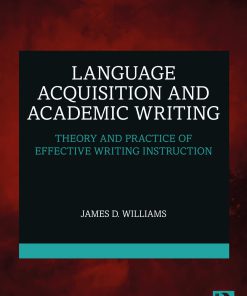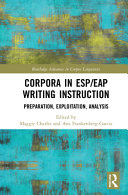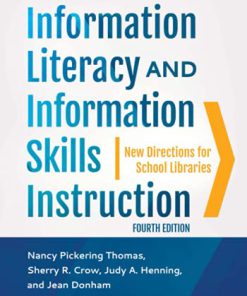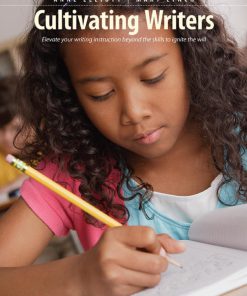Writing Instruction to Support Literacy Success 1st Edition by Evan Ortlieb, Earl H Cheek, Wolfram Verlaan ISBN 9781786355256 1786355256
$50.00 Original price was: $50.00.$25.00Current price is: $25.00.
Writing Instruction to Support Literacy Success 1st Edition by Evan Ortlieb, Earl H Cheek, Wolfram Verlaan – Ebook PDF Instant Download/Delivery: 9781786355256 ,1786355256
Full download Writing Instruction to Support Literacy Success 1st Edition after payment

Product details:
ISBN 10: 1786355256
ISBN 13: 9781786355256
Author: Evan Ortlieb, Earl H Cheek, Wolfram Verlaan
Writing Instruction to Support Literacy Success 1st Edition Table of contents:
- Rethinking Writing Products and Processes in a Digital Age
- The Re-Membered Literacy Component
- The High Stakes of Writing Development
- Write Now
- Theoretical Underpinnings of Writing
- Writing as a Practice
- A Shift toward Student-Centered Pedagogies
- Maintaining the Motivation to Write
- Opportunity and Challenge
- Mixing the Process and Product Approaches
- Digital Writing
- Connecting Writing to Reading Today
- References
- Turning around the Progress of Struggling Writers: Key Findings from Recent Research
- Design of Our Study
- Participants
- Sources of Data
- Analysis
- Findings
- Key Feature of High Progress Students: Increasing Message Complexity
- Teacher Support to Increase Message Complexity
- Key Feature of High Progress Students: Improved Legibility
- Teacher Support of Legibility
- Key Feature of High Progress Students: Growing Independence
- Teacher Support for Growing Independence
- Increasing Responsibility to Use Sources of Knowledge
- Creating Spaces for Problem-Solving
- Practical Implications
- Become familiar with linguistic complexity
- Teach for linguistic complexity
- References
- Appendix
- Accelerating Student Progress in Writing: Examining Practices Effective in New Zealand Primary Schoo
- Introduction
- The Context
- A Theoretical Lens
- Aims and Scope of the Chapter
- Potential, Powerful Practices for Developing Writing and for Accelerating Progress
- Knowing Your Writers
- Making Connections with and Validating Cultural and Linguistic Funds of Knowledge
- Learning Goals and Tasks: Alignment and Transparency
- Providing Quality Feedback
- Scaffolding Self-Regulation in Writers
- Direct, Targeted Instruction
- Differentiating Instruction
- Conclusion
- References
- Ideas as a Springboard for Writing in K-8 Classrooms
- Theoretical Perspectives on Idea Generation and Composing
- Quality of Ideas and Writing Achievement
- Methods
- Literature Search Methods
- Data Analysis and Synthesis
- Findings
- Students’ Sources and Processes for Idea Generation and Composing
- Knowledge Sources and Preferences for Composing
- Intertextual Processes for Idea Generation and Composing
- Classroom Dialogue
- Self-Talk
- Peer-Talk
- Play, Drama, and Drawing
- Instructional Dimensions Mediating Students’ Development of Ideas
- Influences of Content Curriculum and Literature
- Strategy Instruction
- Visual and Symbolic Tools
- Approaches to Writing Instruction
- Motivation to Write
- Discussion and Practical Implications
- Conclusion
- References
- Process with a Purpose: Low-Stakes Writing in the Secondary English Classroom
- Writing: Process or Product?
- Writing Appraisal: Progress or Performance?
- Freeing Students to Write
- Fruitful Feedback, Further Thinking
- Lowering the Stakes
- Responding to In-Process Writing
- Low-Stakes with a Purpose: Focused Freewriting
- Inviting Improvement through On-Going Conversations on Paper
- References
- Learning Language and Vocabulary in Dialogue with the Real Audience: Exploring Young Writers’ Auth
- Introduction
- Literature Review
- Morphological Awareness
- Vocabulary Development
- Methodology
- Conceptual Framework
- Data Collection
- Data Analysis and Limitations
- Findings
- Learning Vocabulary and Language Use through Immersion/Acquisition
- Learning Vocabulary and Language Use through Instruction
- Discussion and Implications
- Learning Vocabulary and Blogging
- Language Study and Blogging
- Implications
- Notes
- References
- Understanding a Digital Writing Cycle: Barriers, Bridges, and Outcomes in Two Second-Grade Classroom
- Perspectives
- Literature Review
- Digital Literacies in Elementary Classrooms
- Process Approach to Digital Writing in Elementary Classrooms
- Opportunities and Challenges in Digital Literacy Classrooms
- Methodology
- Context and Participants
- Data Collection
- Data Analysis
- Findings
- Student Barriers in Digital Writing Classrooms
- Diverse Background Experiences of Students
- Cognitive Overload Experienced by Students
- Teacher Bridges in Digital Writing Classrooms
- Incremental Introduction of Digital Tools Following a Process Writing Approach
- Implementation of Social Support Structures
- Outcomes in Digital Writing Classrooms
- Increased Engagement by Students
- Expanded Perspectives of Writing Achievement by Teachers
- Discussion
- Lesson One: Teaching in a Digital Literacy Context Starts with Early Practice
- Lesson Two: Teaching in a Digital Writing Classroom Encourages Teachers and Students to Learn Togeth
- Lesson Three: Teaching in a Digital Writing Classroom Requires Collegial Support
- Lesson Four: Teaching in a Digital Writing Classroom Impacts Teacher Planning and Instruction
- Lesson Five: Teaching in a Digital Writing Classroom Creates an Engaging Cycle
- References
- Classroom Writing Community as Authentic Audience: The Development of Ninth-Graders’ Analytical Wr
- Theoretical Framework: Uptake of Discourse through a Community of Practice
- Research Questions
- Methods
- Setting
- Participants
- Mr. Campbell
- Students
- Sula
- Researcher Role
- Data Sources
- Classroom Observation Field Notes
- Interviews
- Student Work
- Data Analysis
- Overview: Building the Classroom Writing Community as an Authentic Audience
- Writing for Immediate Audience
- Preparing for a Future Audience
- Introducing Analytical Writing
- Class One: Guided Inquiry/Crafting a Thesis Statement
- Viewing of the Equalizer Trailer to Define Interpretation of a Literary Work
- Using a Former Student’s Model Essay to Frame Expectations and Goals for Writing
- Using Guided Inquiry to Discuss the Composing Process
- Sula Case Study Part I: The Composing Process through Guided Inquiry
- Class Two: Inquiry Discussion/Thesis Statement Workshop
- Sula Case Study Part II: Revising During the Thesis Workshop
- Summary
- Discussion: Dual Role of Audience
- Classroom Community: Rhetorical Choices, Effective Communication, and Support
- Wider Discourse Communities: Meaningful Interactions and Writing Identities
- Instructional Implications: Student-Centered Practices
- Conclusion
- Notes
- References
- Engaging Students in Multimodal Arguments: Infographics and Public Service Announcements
- Infographics as Argument
- Planning for Students to Create Infographics
- Instructional Activities
- Elements of Argument
- Multimodal Composing and Digital Tools
- Public Service Announcements as Argument
- Planning for Public Service Announcements
- Instructional Activities
- Elements of Argument
- Multimodal Composing and Digital Tools
- Potential Benefits for Students Exploring Multimodal Arguments
- References
- The Use of Google Docs Technology to Support Peer Revision
- Review of Literature
- Peer Revision
- Peer Revision and Adolescents
- Revising and Google Docs Technology
- Research Questions
- Method
- Data Analysis
- Results
- Students Used Highlighting and Virtual Comments to Facilitate Peer Revision
- Students Learned Evaluation Criteria
- Students Focused on Adding Additional Details during Revision
- Students Improved the Quality of their Writing
- Students were Motivated to Write and Revise using Google Docs
- Discussion
- Recommendations for Teachers
- Conclusion
- References
- A Framework for Literacy: A Teacher–Researcher Partnership Considers the “C-S-C Paragraph” and
- Introduction
- The Classroom
- The Problem
- What do We Know?
- Writing to Learn, Writing to Argue
- Rhetoric
- Adolescent Literacy, Social Practice, and Situated Learning
- Methodology
- Findings
- Curriculum and the C-S-C: Teachers’ Pedagogical Journeys
- Scaffolding and the C-S-C: Toward the Visual
- Written Production and the C-S-C: Routinizing High Expectations
- Discussion and Implications
- References
- Powerful Writing Instruction: Seeing, Understanding, and Influencing Patterns
- Building Capacity in Complex Adaptive Systems
- Developing the Lesson Frameworks and Teacher Support
- What Happened? Seeing and Documenting the Patterns
- Patterns in Teacher Reports of Student Changes
- Patterns in Teacher Reports of Their Changes
- Patterns in Student Outcomes on the Test
- Summary of Findings
- So What? Now What?
- References
- Fourth Graders as Researchers: Authors and Self-Illustrators of Informational Books
- Theoretical Framework
- Writing Process
- Perspective
- Methodology
- Participants
- Data Sources and Collection
- Data Analysis
- Classroom Writing Context
- Browse, Collect, Collate, and Compose
- Elements of Writing Workshop and Writing
- Revising and Editing
- Conferencing
- Publishing and Author’s Chair
- Mentor Texts, Modeling, and Read Alouds
- Use of Mentor Texts
- Teacher Modeling
- Reading Aloud
- Outcomes for Students
- Increased Schema for Research
- Appeal of Writing with a Self-Selected Topic
- Enhancement of Composing through Captured Personal Images
- Computer Use Provides Incentive
- Developed Sense of Community
- Discussion
- Conclusion
- References
- Children’s Literature Cited
- Seniors, Scholars, Researchers: Using an Inquiry Approach to Writing the Research Paper
- Early Birds are Inquisitive
- Purpose of this Chapter
- The Scholars’ Context
- Inquiry as Stance
- Inquiry Learning, Critical Literacy, and Critical Constructivism
- Research Reboot: Creating a Culture of Inquiry
- Course Structure
- Guided Inquiry Design
- Creating a Space for Critical Inquiry
- Application to the Classroom
- Flip the Script on the Thesis Statement
- Allow for More (Uncomfortable) Time to Read Widely and Deeply
- Put the Focus on the Process, not the Product
- Form a Guided Inquiry Team with Your Librarian
- Final Thoughts
- References
- Appendix A
- Appendix B: East Valley* Senior Scholar Research Symposium 2016 Call for Proposals
- Critical Inquiries for Critical Communities
- Theme Description
- Proposal Guidelines
- Submission Requirements
- Appendix C
- Augmenting Academic Writing Achievement for All Students
- Theoretical Framework
- Review of Literature
- Collaborative Discovery Groups
- Methodology
- Participants
- The Design of the Study
- Collaborative Discovery Groups
- Grand Conversations
- Think–Pair–Share Writing Approach
- Communication for Specific Purposes
- Collaborative Discovery Groups for Writing
- The CDG Writing Process
- Data Analysis: The Quantitative Side
- Substantive Coding
- Summative Coding
- Comparing the Sets of Letters
- Findings
- Generation of Expository Knowledge with Mini-Lessons
- Construction of Knowledge – The Schematic Process as a Prism
- Communication of Knowledge – Understanding the Schematic Process
- Academic Writing – Discovering the Nature of Academic Schema
- Exemplary letters
- The Grand Conversations in the Collaborative Discovery Groups
- Instruction and Sociocultural Interaction Tailored for Academic Writing
- Individually Produced Academic Documents
- Exploring and Interacting with the Schema for Effective Academic Writing
- Practical Implications
- Conclusion
- References
- Appendix A
- Collaborative Discovery Project: Instructions for Co-researchers
- Purpose
- Classroom Procedure
- Materials
- Research Participation
- Appendix B
People also search for Writing Instruction to Support Literacy Success 1st Edition:
writing supports
literacy writing strategies
literacy instruction examples
a. writing helps us develop more complex language structures
literacy instruction best practices
Tags: Evan Ortlieb, Earl H Cheek, Wolfram Verlaan, Writing Instruction, Support Literacy Success
You may also like…
Reference - Writing
Reference - Writing
Education Studies & Teaching - School Education & Teaching
dictionaries & phrasebooks
Education & Teaching
Education Studies & Teaching - School Education & Teaching
Reading for Life High Quality Literacy Instruction for All 1st Edition Lyn Stone
Education Studies & Teaching - Education - General & Miscellaneous
Education Studies & Teaching - Teaching - Reading & Language
Education Studies & Teaching - Teaching - Reading & Language











